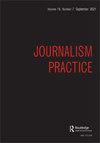Implications for Hybrid Newswork from the Work-from-Home Activities of Local US Television Journalists During COVID
IF 2.2
2区 文学
Q2 COMMUNICATION
引用次数: 0
Abstract
In response to the COVID-19 crisis, many local television (TV) newsrooms decided to have employees work from home (WFH) or from the field rather than from the newsroom, creating a kind of hybrid work characterized by flexible work location. From a review of research on telework and WFH, we identified possible impacts of WFH on work and on workers, with a particular focus on news work and news workers. Data on the impacts of hybrid work are drawn from interviews with local television news directors and journalists in the United States and observations of remote work. We found that through creative application of technology, WFH news workers could successfully create a newscast, albeit with some concerns about story quality. However, WFH did not seem to satisfy workers’ needs for socialization or learning individually or as a group. Lifted restrictions on gatherings are mitigating some of the experienced problems, but we expect to see continued challenges to news workers’ informal learning in hybrid work settings. (164 words)COVID 期间美国地方电视台记者在家工作活动对混合新闻工作的启示
为了应对 COVID-19 危机,许多地方电视台(TV)的新闻编辑室决定让员工在家工作(WFH)或在外地工作,而不是在新闻编辑室工作,从而形成了一种以灵活工作地点为特点的混合工作方式。通过对远程工作和全时工作的研究回顾,我们确定了全时工作对工作和工作者可能产生的影响,尤其关注新闻工作和新闻工作者。有关混合工作影响的数据来自对美国地方电视台新闻总监和记者的采访,以及对远程工作的观察。我们发现,通过创造性地应用技术,全时工作的新闻工作者可以成功地制作新闻节目,尽管在报道质量方面存在一些问题。然而,全时工作似乎并不能满足新闻工作者个人或集体的社交或学习需求。取消对聚会的限制正在缓解一些遇到的问题,但我们预计新闻工作者在混合工作环境中的非正式学习仍将面临挑战。(164字)
本文章由计算机程序翻译,如有差异,请以英文原文为准。
求助全文
约1分钟内获得全文
求助全文
来源期刊

Journalism Practice
COMMUNICATION-
CiteScore
5.50
自引率
14.30%
发文量
111
期刊介绍:
ournalism Practice provides opportunities for reflective, critical and research-based studies focused on the professional practice of journalism. The emphasis on journalism practice does not imply any false or intellectually disabling disconnect between theory and practice, but simply an assertion that Journalism Practice’s primary concern is to analyse and explore issues of practice and professional relevance. Journalism Practice is an intellectually rigorous journal with all contributions being refereed anonymously by acknowledged international experts in the field. An intellectually lively, but professionally experienced, Editorial Board with a wide-ranging experience of journalism practice advises and supports the Editor. Journalism Practice is devoted to: the study and analysis of significant issues arising from journalism as a field of professional practice; relevant developments in journalism training and education, as well as the construction of a reflective curriculum for journalism; analysis of journalism practice across the distinctive but converging media platforms of magazines, newspapers, online, radio and television; and the provision of a public space for practice-led, scholarly contributions from journalists as well as academics. Journalism Practice’s ambitious scope includes: the history of journalism practice; the professional practice of journalism; journalism training and education; journalism practice and new technology; journalism practice and ethics; and journalism practice and policy.
 求助内容:
求助内容: 应助结果提醒方式:
应助结果提醒方式:


